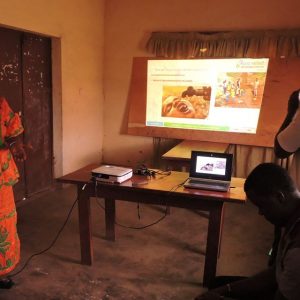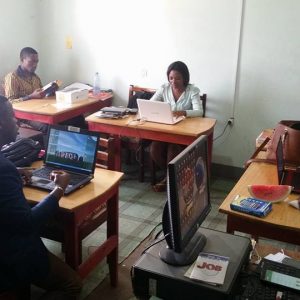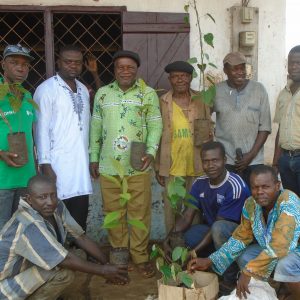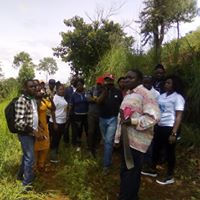Collaborative Research
Research is vital for improving scientific knowledge. It contributes to predicting, describing, explaining, and improving knowledge of ideas and concepts through systematic approaches. We carry out research projects which cut across areas such as environment, governance, socio-economic development, food and agriculture, education and development, integrated water resource management, forests, climate change, environmental health, and renewable energy.
Environment Conservation
We are engaged in participatory research to ensure sustainability in environmental conservation programs. The environment and development research program cut across the following area:
- -Wildlife Conservation
- -Ethnobotany
- -Community Forest Conservation
- -Natural Resource Management
- -Landscape Restoration
- -Conservation Education
Governance
This program seeks to invite government, civil society, the private sector, and academia to participate in dialogues and collaborative research partnerships that seek to generate solutions, and most importantly, inclusive multi-stakeholder solutions to solving contemporary and emerging governance/developmental challenges. In terms of policy design, this program emphasizes the following targets:
-Participatory and inclusive development
-Human rights and governance
-Indigenous people and the right to development
-Given the above targets, the program seeks to provide training and scholarship at the disposal of affected groups and communities.
Food and Agriculture
Our main goal is to contribute to sustainability in environmentally friendly agricultural technologies that contribute to food security. In this way, we aim to engage in research and provided technical support in the following areas of food and agriculture:
- -Agriculture and land-use policy
- -Food supply chain
- -Organic Farming and agroforestry
- -Animal husbandry and welfare
- -Post-harvest technology
Environment and Climate Change
Climate change has been described as one of the greatest challenges of our time because its effects are leading to extreme events like drought, floods, landslides, and food insecurity. The root cause of climate change is believed to be global warming linked to the anthropogenic emission of gases such as CO2, CH4, and other greenhouse gases. All these have continually increased world temperature and the consequences of these alterations are starting to become more visible as climate condition and ecosystem begins to change. Climate changes represent a new threat and challenge to many households and social groups with a limited capacity to adapt. Household adaptive capacities are weakened by factors such as high levels of poverty, diseases, poor governance, and conflicts among others.
Climate change interventions (reduce the sources of greenhouse gases or enhance the sinks to remove carbon dioxide from the atmosphere) and adaptive capacity (the ability of a system to adjust to climate change, moderate potential damages, take advantage of opportunities, or cope with the consequences) are major challenges that need to be addressed in the current debates. Current mitigating majors are based on the following majors:
- -Promotion of transfer of technologies for the implementation of adapting actions at the local level, including natural resource conservation systems.
- -Addressing the concern of all vulnerable groups, whose adaptive capacity is low, particularly women, the elderly, the physically challenged, and the children who are particularly affected by the impacts of climate change.
- -Infrastructural investment through the use of climate change-proofed technologies.
- -Support the development and implementation of regional medium and long-term adaptation strategies and activities.
- -The protection of ecosystems includes transboundary ecosystems, which are particularly vulnerable such as the coastal, marine, wetlands, and freshwater ecosystems.
- -The development of climate change-related Disaster Risk Reduction and management as an adaptation tool should be emphasized in the negotiations.
The impact of climate change is going to affect the poorest communities the most, so the focus is shifting to formalizing community-based adaptation to climate change. Even with the best of intentions and lots of resources made available by the international community toward climate change, it will only trickle down to the poorest and most vulnerable.
Forest carbon sequestration is one of the key approaches to reducing atmospheric carbon concentration. This can be done by estimating that forestry projects such as protecting, planting, and replanting forests will constitute as much as 25 percent of the total global abatement potential. Therefore, forestry can help mitigate climate change through afforestation, reforestation, avoided deforestation, silviculture change, and biofuel and carbon storage in wood products. This defines our line of interest in forests and climate change.
Integrated Water Resource Management
Water is a key driver of economic and social development while it also has a basic function in maintaining the integrity of the natural environment. However, water is only one of several vital natural resources and water issues mustn’t be considered in isolation. Managers, whether in the government or private sectors, have to make difficult decisions on water allocation. More and more they have to apportion diminishing supplies between ever-increasing demands. Drivers such as demographic and climatic changes further increase the stress on water resources. The traditional fragmented approach is no longer viable and a more holistic approach to water management is essential.
This is the rationale for the Integrated Water Resources Management (IWRM) approach that has now been accepted internationally as the way forward for efficient, equitable, and sustainable development and management of the world’s limited water resources and for coping with conflicting demands.
Our research in this area is focused on understanding the challenges in management, policy, and the developments in the water sector in specific contexts, to inform management decisions that can lead to sustainability in water management.
Ongoing Research
Research is considered the foundation to improve knowledge of ideas, and concepts in our society. CEPOW takes it as a challenge to get involved or focus on research to provide sustainable solutions to uprising challenges. This will ensure appropriate prediction, descriptions, and explanations in the research domain. We carry out research projects in areas of environment, development, and governance. Ongoing researches include Climate Smart Agriculture, “Improving the production and productivity of yam seedlings through the mindset technology”. Assessing the feasibility of creating a wildlife corridor in the Kagwene and Mbulu Wildlife sanctuary
Ecotourism “Identify and analyze the eco-touristic potential of the Kimbi national park”



